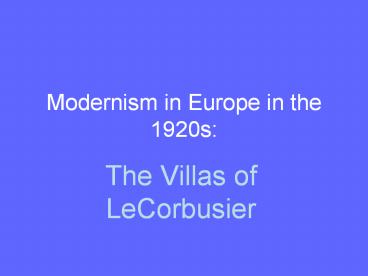Modernism in Europe in the 1920s: - PowerPoint PPT Presentation
1 / 31
Title:
Modernism in Europe in the 1920s:
Description:
IPK International - The World Travel Monitor Company 7 ... order customised data packages - annual subscriptions - three-year contracts ... – PowerPoint PPT presentation
Number of Views:88
Avg rating:3.0/5.0
Title: Modernism in Europe in the 1920s:
1
Modernism in Europe in the 1920s
- The Villas of LeCorbusier
2
La Maison Citrohan (1922) Project (Citrohan
sounds like Citroen in French). This design
was intended to be as efficient as that of a
Citroen automobile.
Model
Drawings
3
This arrangement of spaces became a signature
treatment in LeCorbusiers housing projects.
4
Paris, House and Studio for Amedee Ozenfant, 1923
5
(No Transcript)
6
Garches, Villa Stein, 1926
7
Villa Stein, Garden Facade
8
(No Transcript)
9
(No Transcript)
10
Villa Stein, regulating lines underlying the
composition of the facades.
11
(No Transcript)
12
(No Transcript)
13
(No Transcript)
14
(No Transcript)
15
(No Transcript)
16
(No Transcript)
17
Villa Savoye (Les heures claires),
Poissy-sur-Seine, 1928-30
18
The Villa Savoye is one of the classic
achievements of European modernism in the
abstract/functionalist category. Designed by
LeCorbusier for a wealthy Parisian family, the
villa was one of the first in which he embodied
his philosophical and aesthetic ideas about
architecture most adroitly. The nickname of the
villa--Les heures claires--is probably a pun.
In French this term refers to leisure time (lit.
clear hours), but it also contains the notion
of clearing ones head and of purifying ones
thought processes. The villa was originally
suburban and in the middle of fields. The
approach to it by car and then the movement
through it on foot were carefully calculated to
produce a series of experiences that were not
only memorable but thought-provoking. Beginning
with the approach, one sees the villa as a
machine in the garden. It is clearly a human
production, unconfusable with nature.
19
(No Transcript)
20
(No Transcript)
21
(No Transcript)
22
The villa is in essence a simple volume lifted on
columns above the ground. While this idea is
rooted in the Dom-ino house, it moves well
beyond the basic notion to explore a subtle shift
in the column grid as well as the enclosure of
part of the ground floor space and the use of
ramps as well as a variety of stairs to move from
level to level. The columns also shift from
round to square cross-section where the grid
changes on the interior. The ramp became an
important theme of modernism, not because it was
invented here but because its purpose and
disposition in this design is so well conceived.
The ramp is a subtle spatial experience that
takes the observer from the darker lower level to
the more brightly illuminated main floor and then
on up to the completely exposed roof garden.
23
(No Transcript)
24
(No Transcript)
25
(No Transcript)
26
(No Transcript)
27
(No Transcript)
28
(No Transcript)
29
(No Transcript)
30
The climax of the procession up the ramps occurs
when the house, first seen in the midst of nature
(the machine in the garden), turns out to
enframe a view of nature through the window
opening in the wind screen.
31
(No Transcript)































